Text
happy birthday my glorious king











You've awakened multiple things in me I didnt know existed and im still deciding whether I love you for it or resent you for it
82 notes
·
View notes
Text
Invalid reasons for why a character should not be redeemed:
They’re too evil! - Redemption has nothing to do with how good or evil you were to begin with.
They don’t deserve it! - Redemption is not something that can be “deserved.”
Their actions are unforgivable! - Redemption has nothing to do with forgiveness.
It’s too late for them to change! - It is only “too late” to choose redemption when a character is dead (unless the scope of the story includes an afterlife in which change is possible).
Valid reasons for why a character should not be redeemed:
It doesn’t fit the themes of the story.
They’re not an important enough character for showing the process of a redemption arc to be worthwhile.
They’re more interesting as a character who isn’t doing the right thing.
It’s more satisfying to let them keep being evil.
It makes it more satisfying when they die.
There’s probably more, but you get the idea.
Remember, redemption is when someone realizes they are wrong, and takes steps to doing the right thing. That is not something that can be “deserved,” it is not something that hinges on forgiveness, and it is not something that it is ever too late for! …Unless the person is dead or something.
7K notes
·
View notes
Text
This is how it ended btw 🤙

Okay tbh I like when a show hurts me - I appreciate an author`s ability to invoke emotion in me, and I do not mind how things went in the original - it led to some amazing character development and I appreciate it!
But i can simultaneously appreciate canon and make my bittersweet AUs 👍
#hunter x hunter#hxh#I LOVE THIS#I AM EMOTIONAL#the only thing I would change about this arc#I mean don’t get me wrong… he lived on as an ant but#they didn’t need to do my boy like that
149 notes
·
View notes
Text
hating gabi bc you love sasha too much is so weak like my favorite character is bertholdt and you will never ever NEVER catch me hating on armin. skill issue
206 notes
·
View notes
Text
HAPPY BIRTHDAY TO ZEKE AND REINER I don't have any art of Reiner (which is a crime bc he's my 2nd favorite) and ran out of colored Zeke art so today I bring you a SKETCHDUMP instead



More below!
They`re all frames from an OCXcanon comics so pardon the awkward cropping on some Timeline (canon + headcanon)





from a silly winter funtime comic






ModernAU teen (+1 adult) Zeke






And some emotions from another lil comic


#it’s so perfect#i love this art style#accidentally a zeke stan#zeke brainrot continues#zeke yeager#zeke jaeger
82 notes
·
View notes
Text
luigi mangione facing the death penalty just seems like a bad decision for america. so there's this guy that everyone loves and considers a hero, and we arrested him after very obviously planting fake evidence. and now we're going to subject him to an unfair trial and kill him at the end. there's no way anyone will be mad about that right
#luigi mangione#if they make him a martyr i will only stan harder#reminder to donate to his givesendgo#i have not forgotten about you luigi#you gave us a speckle of hope
24K notes
·
View notes
Text





I am rewatching the Teen Titans cartoon with my partner, and importantly, this plus the extensive databases of screencaps for this show will be allow me to note all the times Starfire carries someone for my ladies carrying people tag.
(she also carries Robin out of the way of a giant gear at the end of Apprentice II but the database did not have that screencap)
(I posted one of the last two in the tag before in the post that notes how much she carried Dick in the comics, but for completions sake. also the second to last is Raven-in-Starfire's body)
also Starfire-in-Raven's body, which seems to confirm Raven is physically strong enough to carry Starfire with one hand? Air currents might be doing a lot of work here, but Raven-in-Starfire did seem to trust Starfire-in-Raven to carry her.

43 notes
·
View notes
Text
for a while now i’ve been learning that some people kind of choose to hate themselves like you can give them tools and resources and advice and they’ll even follow some of it and go “i still hate myself” and i feel strongly at that point they’re kind of choosing to stay in that mindset because it’s comfortable and familiar or something but some people are truly [gotye voice] addicted to a certain kind of sadness and hooked on feeling low
23K notes
·
View notes
Text

they went off with this
51K notes
·
View notes
Text
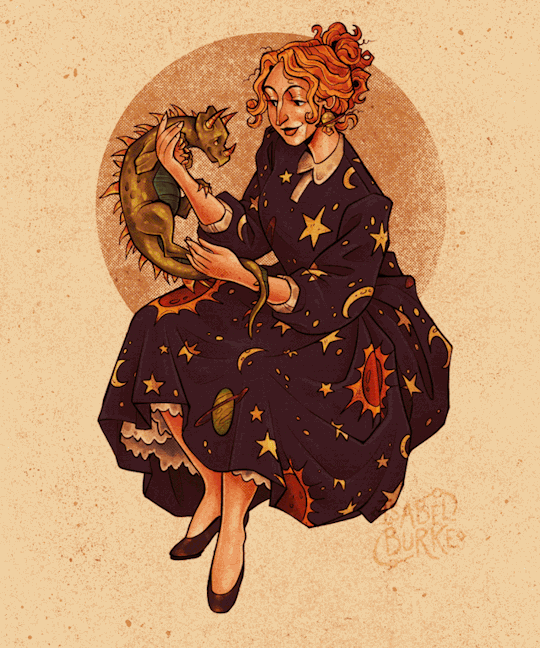
you think you’re going to have a normal field trip and she shows up wyd (cw *slight* flashing images)
✦ find me on instagram @the.flightless.artist ✦
155K notes
·
View notes
Text
Just saw a video analysis about if the Scooby gang could beat Light Yagami. I wasn’t worried about the gang but I didn’t realize how cooked Light was. Velma alone is way smarter than L, Freddy would instantly see through the trapped drawer that hid the Death Note and Scooby is such a wildcard overall, who is immune to the Death Note because he isn’t human. So even if he gets the rest of the gang, Scooby is coming with a vengeance.
Funniest scenario is Shaggy and Scooby trailing Light only to be confronted by him. Light tries to kill Shaggy but can’t because he would never just give away his name as “Norville Rogers.” Light thinks Shaggy is some genius playing fourth-dimensional chess with him.
24K notes
·
View notes
Text
ARMIN CHOSE TO TELL HIS TRUTH AND THAT MADE ALL THE DIFFERENCE


Towards the end of Attack on Titan Season 4, the long-awaited ships, AruAni, EreMika, and LeviHan—each faced a similar emotional crossroads, though at different points in the story. These moments revolved around a single question: would they finally confront and acknowledge the feelings they had kept buried for so long? Each pair had previously deflected their emotions for different reasons.
1. AruAni - Annie was crystallized and unreachable for much of the series,
2. EreMika - Eren was consumed by his drive to kill all the titans and later for the search of freedom.
3. LeviHan - Both Levi and Hange consistently chose duty over personal connection, prioritizing the sacrifices of their comrades above all else.
This narrative parallel added emotional depth to the finale, highlighting the human cost of war, duty, and unspoken truths.
If these characters were able to deflect their feelings for the past 3 seasons, then what changed? It’s simple, in Season 4 the stakes were higher and survival is not definite more than ever. (Even compared during the titans were their only enemies). Heck, even Levi was nerfed so no one’s safe during S04.
Hence the characters’ vulnerabilties were shown.
So back to the confrontations of feelings.
Let’s start with EreMika.

When Eren asked Mikasa "What am I to you? Mikasa hesitated, then she went on to say "You are family." in a sense it was true, but it was not her only truth, Eren was more than a family, additionally, that's not the answer that would make Eren stay, but of course Mikasa was not aware on the extent of Eren’s future plans.
As for Levi, when he was asked by Hange "Shall we live here, just the two of us?" Levi chose to answered with "If we keep running and hiding...what will that get us?" and when he saw the carriage Hange was fixing, continued with, "I know you...you're not able to stay out of action."
He did not reject her proposal but he reminded her who she really is, and he supports her decision and she does not need to explain herself to him. Together, they chose to keep fighting rather than run. It was a clear, rational choice, but it wasn’t Levi’s only truth.


The Ackerman parallels.
Mikasa and Levi who both hesitated to tell the truth when they were confronted by it.
Because of that, Eren and Hange's decision were shaped by the answers they received from Mikasa and Levi. Those questions were crucial in Eren and Hange’s next decisions (spoiler alert, they both sadly died)
But when Armin was faced with the same situation, He chose to say his truth.
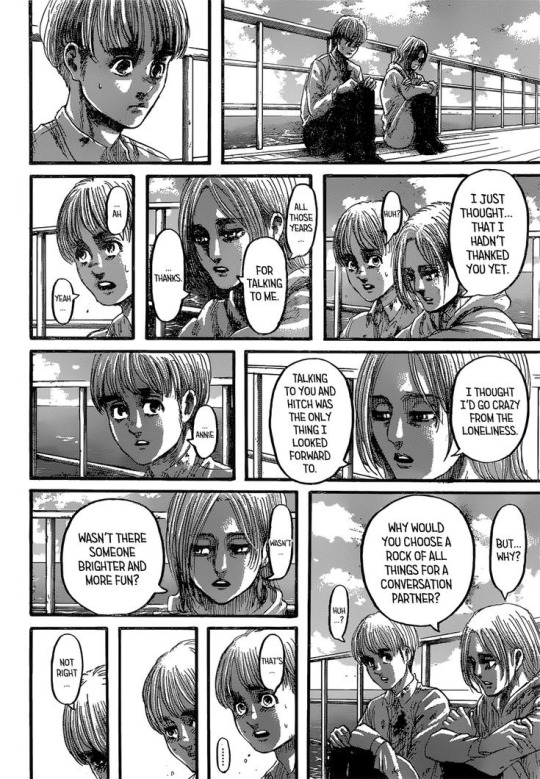

When he was confronted by it, he didn’t hesitate to tell Annie the truth. Shy, yes—but not hesitant. He didn’t think of their fallen comrades. He didn’t stop to wonder if it was selfish to speak of feelings, even as the world was being destroyed by The Rumbling. He didn’t believe that him and Annie coming to terms with how they felt would hinder their mission.
Even if he knew that Annie may or may not reciprocate his feelings, he continued to fight even if Annie chose to stay behind. Armin chose to say his truth because he does not want to have any regrets. No matter what happens with the battle with Eren, at least he was able to tell his truth. And it was worth it, because of Annie’s reaction to his confession, he got his answer. Annie reciprocates his feelings.
Annie's next decision, even is not solely based on Armin's answer, but it was influenced by it. Annie’s decision to stay behind was now final and she has no doubts about it now. She does not want to fight anymore and she doesn't want to see any of the alliance get hurt, specially Armin so it finalized her decision not to fight anymore. (Yes she decided to fight again, but that was because the discovered Falco's ability to fly and Armin was taken.)
Imagine what would happen if Armin deflected the question or he had other thoughts than just saying his truth.
For Armin, choosing the truth is not selfish, even if Annie said that it does not feel right to talk about their feelings while The Rumbling was happening but it did not stop him.
For Levi and Mikasa, they both missed the chance. And those missed chances will then lead to them loosing the people they deeply care about.
I wonder, even if the chances of living their dreams of having a peaceful life with the people they love were slim, even futile—what might have happened if Mikasa and Levi had chosen to speak the truth? Would it save Eren and Hange? Or were they always meant to lose them, no matter what they said?
#absolutely true that each of these duos were given a moment to seriously change the direction of their lives#armin really was the main character for me though#it made sense that he broke the pattern#my baby broke barriers!!!#aot character analysis#attack on titan#aruani#aot
55 notes
·
View notes
Text

Are You Satisfied?
As you might have heard chapter 236 of Jujutsu Kaisen ends with the death of Gojo Satoru. The fandom is making a pretty big deal about it. As someone who predicted from the beginning that Gojo was going to lose against Sukuna, the reaction is fascinating to me. This is perhaps the most controversial chapter of Jujutsu Kaisen I've ever seen. So I've decided to throw my hat into the ring.
The central theme of Jujutsu Kaisen is death, so the death of one of the main characters isn't too surprising, but what does Gojo's death mean for the story? What does it say about his character?
As I said above I am a little bit shocked by the extreme controversy over Gojo's death. Gojo was never going to win the fight in the first place, because Jujutsu Kaisen is a story and the story would be over if he defeated Sukuna. He'd easily be able to take care of Kenjaku afterwards and the main conflcit would be resolved. Would it really be an interesting story if Gojo one shotted the villains while the kids just wathced on Television?
The story is also not about Gojo, it's about the students. Gojo may think he's the protagonist of reality but he's not the protagonist of the story.
Once again, Jujutsu Kaisen is a story and stories have themes. We may grow personally attached to characters, but characters are just narrative tools to convey the themes of a story, no different from prose, dialogue, and art. Characters are a tool to be used well or used poorly, and sometimes yes that means killing them. Whether Gojo's death was naratively satisfying though isn't the purpose of this post though we're only asking what does it mean?
Finally, Jujutsu Kaisen is not only a fictional story, it's specifically a tragedy. Full disclosure, it's a manga about death.
The Protagonist of a Tragedy
So, number one shout out to me for making this post 4 months ago where I called the way Gojo would end the fight.


Excuse me while I fist pump for calling it!
The question on everyone's minds is why does one of the most powerful characters in the manga die offscreen in a pretty humiliating way, cut in half and helpless on the ground just like Kaneki. The reason Gojo didn't get a more heroic (or cooler) death is because we're not reading My Hero Academia, this is not a story about heroes or even a typical Shonen manga it is a tragedy.
In poetics Aristotle defines tragedy as:
"an imitation of an action that is serious, complete, and of a certain magnitude; in language embellished with each kind of artistic ornament, the several kinds being found in separate parts of the play; in the form of action, not of narrative; through pity and fear effecting the proper purgation of these emotions" (51).
To paraphrase a tragedy is about human action, actions characters make in a tragedy often have dire consequences. One of the most common consequences if the reversal of a hero's fortune, a hero of a tragedy usually starts out on top and ends up on the bottom because of the bad choices they make. If in normal shonen manga characters overcome their flaws through effort and persistence, in Jujutsu Kaisen we see characters more often than not lose to their flaws.
The reason I posted that Kaneki panel specifically is because it was a brilliant moment of narrative punishment for Kaneki's central character flaw. Kaneki the hero's main flaw is that he always fights alone, and he constantly makes that same choice over and over again to fight alone. One of the characters helpfully explains it as well.

Stories are primarily about change. If a character doesn't change they're not serving the plot, unless that specifically is the point. People have pointed out how abrupt it is for Gojo to get sealed in Shibuya, get let out, and then immediately die afterwards but that's kind of the point. Gojo made more or less the exact same choice (he asked for Utahime's help for a buff but otherwise fought the entire battle himself). The definition of insanity and what not, why would doing the same thing over and over again net him a different result?

Not only did Gojo choose to fight alone, but as I've been hammering on and on about in previous meta the entire fight Gojo cared more about fighting a strong opponent then he did saving Megumi, the child he was responsible for.
Jujutsu Kaisen is not a typical shonen manga where everything is resolved by beating a strong villain in a fight. That's specifically why I used the Tokyo Ghoul reference, because the reason Kaneki is defeated offscreen like that is because he thought the world worked like a shonen manga. He has a fantasy sequence where he's fighting Juzo in a shonen battle tournament like this is Yu Yu Hakusho right before it snaps back to reality and he's limbless on the ground.
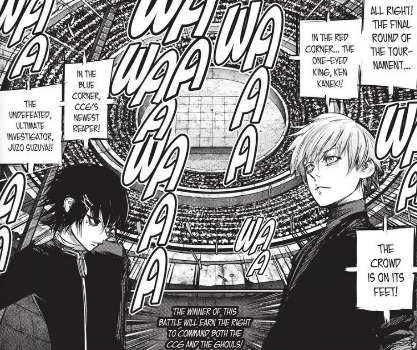
Gojo is a major character in the manga Jujutsu Kaisen, literally "Sorcery Fight" and he is the best sorcerer in the whole world. His entire identity revolves around being a sorcerer. Since he is so good and beloved at what he does, he thinks that everything is resolved by exorcising a curse or defeating a strong opponent. He has basically no identity outside of that. Which is why when he's fighting the possessed body of his student, a person he's been mentoring since childhood his priority is not to save Megumi but to beat a strong opponent. Gojo is a sorcerer, before a human being. That's who he is, that's who he always has been since day one.
I think part of the negative fan reaction comes from fans being really attached to this scene in the manga and deciding Gojo's entire character revolves around being a good mentor figure to children.

Which is just incorrect, Gojo's entire character revolves around being the strongest. On top of that though, Gojo can care about children and also care about being the strongest he can care about multiple things at once and have those things contradict each other because humans are complicated. I'd point out even in this panel where he's stating motivation he's not trying to raise these kids up into being healthy adults, he wants them to be strong Jujutsu Sorcerers. Even when he's raising kids, his intention is to turn them into Jujutsu Sorcerers because everything in Gojo's mind revolves around Jujutsu Sorcery. Gojo does not exist outside of the world of sorcerers. Gojo may be the chosen one but he'd never be able to hold down a job at Mcdonalds.
I think in general readers put more investment in the things characters say out loud, rather than their actions. You can say one thing and do another. I can say "I should never eat sweets again I'm going to improve my diet", and then go and eat ice cream five hours later. Gojo can state out loud his intention to foster children and protect their youths, but then fail to properly do that in the story. Characters are not always what they say they are, that's why they're interesting to interpret. This isn't me calling the readers stupid, just pointing out that Gojo is made up of contradictions. He wants to get rid of the old guard and replace them with something new, but Gojo IS THE OLD GUARD.
If the culling games arc has shown us one thing, it's that ancient sorcerers brought to the modern age do not care that much about human life on an individual level, they are all of them egoists. There's a reason Gojo resembles someone like Sukuna more than he does any other character in the manga. I'm not saying Gojo is exactly like Sukuna, he's far more altruistic and uses his genuinely noble ideals but at the same time Sukuna is a shadow archetype to Gojo he represents Gojo's flaws. The flaws that Gojo succumbs to in tragic fashion.
Which if you believe that Gojo genuinely does love his students, and the ideal he's fighting for is to raise up a better generation and allow them to live out their youths, then Gojo throughout the entire Sukuna fight is acting against those ideals. He cares far more about fighting Sukuna then he does saving Megumi, it's shown over and over again in the battle, Megumi is an afterthought to him. If Gojo care moredefeating the big bad and saving the world is more important than helping a child that Gojo is responsible for then Gojo is acting against his stated principles. Why should Gojo win the fight when he's fighting for all the wrong reasons?
Tragedies are like visual novels, if you make the wrong choice the novel will give you a red flag. If you ignore the red flag then you get locked into the route with the bad ending. Gojo always fights alone. Gojo only ever fights for himself, even if he's using that selfishness in support of a more noble ideal like creating a better generation of sorcerers. If Gojo consecutively makes the same changes then in a tragedy he's not going to be rewarded for it.
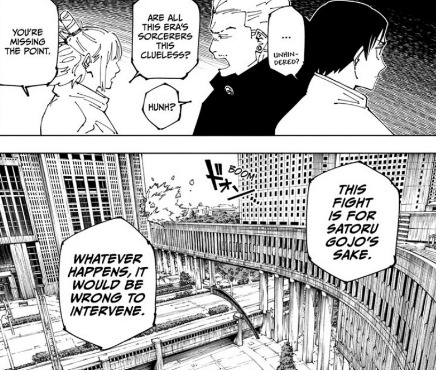
Gojo wants the old generation out and the new generation in, but Gojo resembles the old generation too much. Old sorcerers like Hajime and Sukuna respect him, Hajime argues that Gojo being able to fight for his pride is far more important than him living to the end of the battle when Yuta wanted to interfere and help him.
Gojo's death isn't a surprise curve ball that Gege is throwing us for shock value, it's a result of his choices throughout the manga. A manga about change, and the change between generations is not going to punish a character for remaining roughly the same. Of course you might find it disappointing that Gege didn't give Gojo the chance to grow and change and experience a character arc like Megumi or Yuji, but Jujutsu Kaisen is a tragedy, and the way Gojo's arc ended is consistent with what Gege wrote.

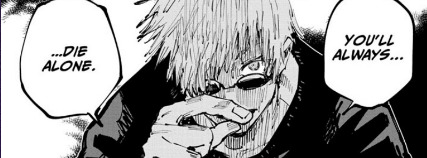
Jujutsu Kaisen is not just a tragedy though, it's a manga about death. The manga begins with Yuji's grandfather warning him not to die alone the way that he did. His grandfather's dying words are what motivate Yuji throughout the beginning of the manga as he's searching for a "proper" death.
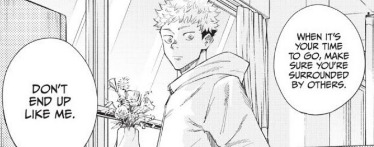
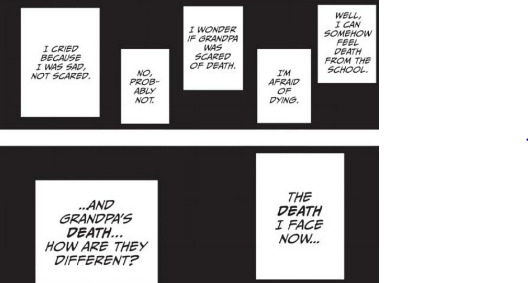

One of the major themes of Yuji's character is a contemplation of death. He accepts that death is inevitable, so he wants to save them from the gruesome deaths they'd experience if they became victims to curses and allow them to have a more satisfying death. Yuji's grandpa died an unsatisfying death because he died alone in a hospital room. Yuji even tries to make his own death a satisfying one because he believes by dying to seal away Sukuna he'll reduce the total number of casualties to curses.
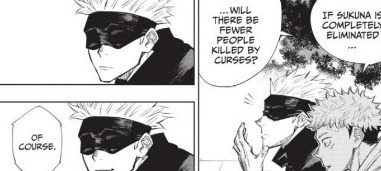
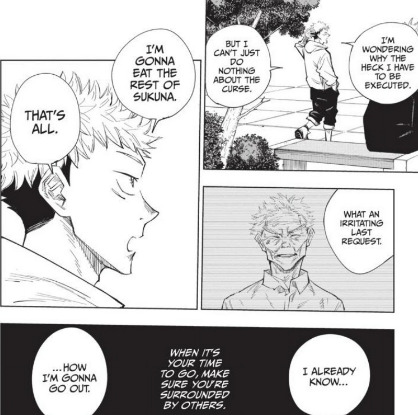
Jujutsu Kaisen keeps investigating the theme of death and what exactly would make for a satisfying death. At one point it's all but stated that death is the mirror that makes humans analyze their lives.
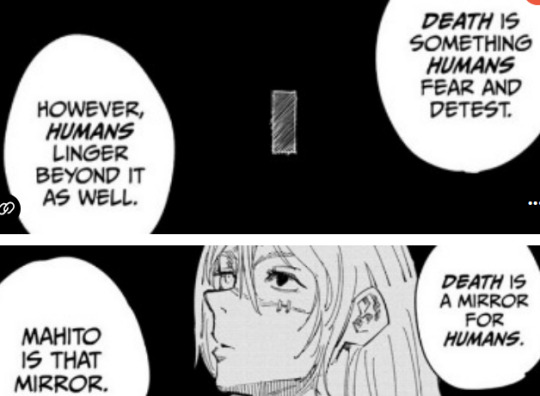
When Yuji fails to save Junpei from the "unnatural death" it calls into question whether or not his goal of saving people from unsatisfying deaths and the gruesome deaths caused by curses is even feasible. Nanami even says that Yuji might not be able to accomplish his goal and warns him away from the path.
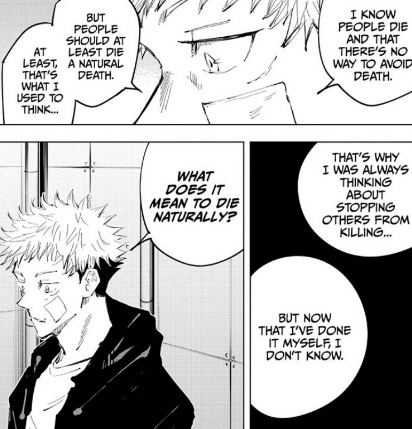
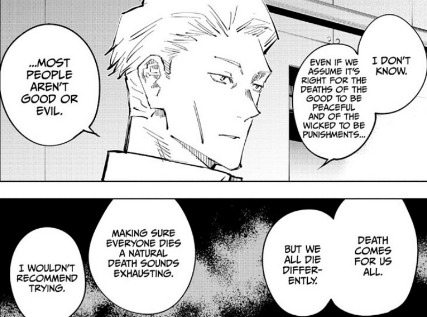
We see repeated unsatifying deaths in the manga, each time someone reflecting on their deaths that they weren't able to get what they wanted out of life. This list comes via @kaibutsushidousha by the way I'm quoting them.
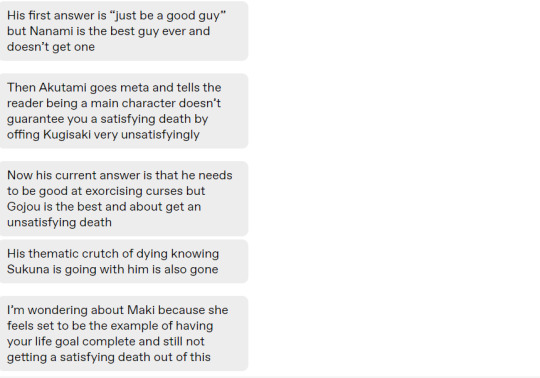
Nanami's a character who chose to work as a sorcerer because he didn't want to evade the responsibility of doing all you can to help people, he wanted to believe he's somewhere where he's needed. He never runs away from responsibility like Mei Mei does so he quite literally works himself to death, living and dying as a sorcerer. Nanami or Gojo's dying hallucination of Nanami even says as much, his death is the result of him choosing to go south and returning to be a sorcerer.
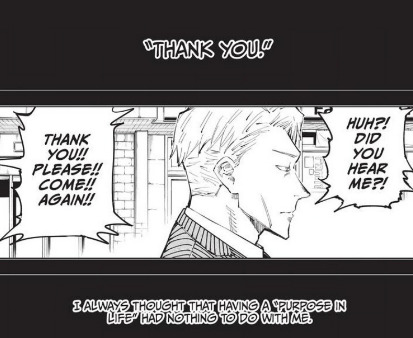
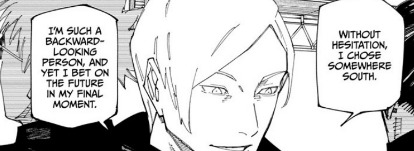
Maki chose revenge against the Zen'in over her sister, and as a result Mai is dead. Maki has all the power in the world now, her revenge complete but she's left with a sense of "now what?" She's as strong as Toji now but she failed to protect her sister, and it's the result of the choices she made. Maki's reflection isn't triumph, it's "I should have chosen to die with her."

Even Yuji himself is robbed of his narrative purpose. The manga began with Yuji saying he wants to choose how he's going to die and he'll die taking out Sukuna with him so he can reduce the number of people killed by curses in the world. Both of those things are thrown in Sukuna's face. Number one the amount of people Yuji can save by permanently killing Sukuna is now a moot point because he let Sukuna rampage in Shibuya.
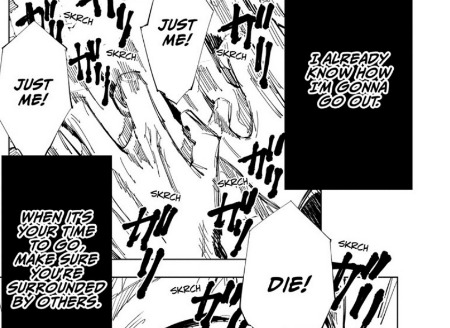
Number two, Sukuna isn't even in Yuji anymore. To build on what Comun said though, this repeated tragedy has a purpose to it and understanding requires understanding that Jujutsu Kaisen is an existentialist manga. Existentialism is basically a school of philosophy centered around the question of "Why do I exist?"
There's nothing about the invetability of death to make you question why you're alive in the first place. In the myth of Sispyhus, Albert Camus boils down all of philosophy to one question.
"There is but one truly serious philosophical problem, and that is suicide. Judging whether life is or is not worth living amounts to answering the fundamental question of philosophy. "
All of philosophy is should I shoot myself in the head or should I keep living? Everything comes after that question, which is why in Jujutsu Kaisen a lot of the characters motivations revolve around them contemplating death. Sorcerers exist in a world where they can die any moment, and as Gojo says most of them die alone. It might be the nature of sorcery itself that causes so many people to die, not only are they dying because they are trapped in an uncaring system, but the characters themselves aren't really attempting to live outside of it. They live and die as sorcerers, replaceable cogs in the machine.
All of these unsatisfying deaths may just be the result of all these characters making one choice, to live as sorcerers rather than people. Because to exist means to live in the world.
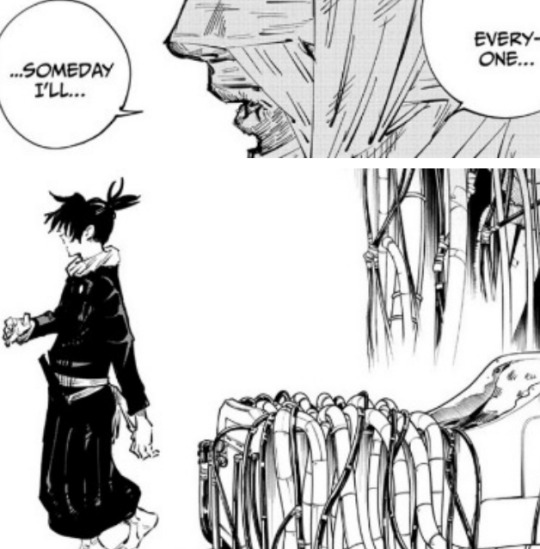

Even in Mechamaru's case, his goal is deeply existentialist by what I defined, all he wants to do is live in the world with everyone else rather than be stuck in his hospital room but his actions contradict that goal. Instead of letting his friends come and visit he's obsessed with the idea of getting a normal body because he feels that's the only way he can exist with everyone else, he makes a deal with the devil, he lies and goes behind their backs. He wasn't living with everyone else in the world and he could have chosen to, he chose wrong and his death is the result of that choice.

Jujutsu Sorcerers aren't living in the world. They're living in a little snowglobe far removed from the world with its own rules, most of them regressive and disconnected from the rest of society. If you define existentialism as just "living in the world' then a lot of these characters aren't, because they only exist in the world of sorcery.
INVISIBLE BUFFY: What are you talking ab- SPIKE: The only reason you're here, is that you're not here. (drinking) INVISIBLE BUFFY: Right. Of course, as usual there's something wrong with Buffy. She came back all wrong. (moving around on the bed) You know, I didn't ask for this to happen to me. SPIKE: Not too put off by it though, are you? (drinking) INVISIBLE BUFFY: No! Maybe because for the first time since ... I'm free. She tosses the sheet aside. Spike looks around, trying to figure out where she's going. INVISIBLE BUFFY: Free of rules and reports ... free of this life. SPIKE: Free of life? Got another name for that. Dead.
Not living in the world with everyone else is the same as being dead.
A lot of these characters either make the choice to act alone, or be a jujutsu sorcerer rather than a person and because of that they die as sorcerers, b/c sorcerers die that's what they do. Mai didn't want to keep living as a hindrance to Maki so she kills herself. Maki didn't want to be anything other than a sorcerer, so her little sister dies and she's not a big sister anymore. Nanami chose to leave his job behind and become a sorcerer again, he dies as one.
Of course I don't think the manga is punishing characters for being too egotistical, but rather too unbalanced. If anything Mai is too selfless and that is why she died, she didn't want to live for herself and chooses self sacrifice for her sister. An unbalance between selfishness or selflessness results in an underdeveloped ego. Jujutsu Kaisen doesn't punish individualism per se, moreso if you're not a fully developed individual you won't last long. Because it's also a manga about growing up in the world, and a person who doesn't have a healthy, mature, well-balanced sense of self is not a grown up.
This twitter user det_critics points out that Gojo (and also Yuki + Yuji's) failures in the manga can be attributed to the fact they don't have real senses of self.
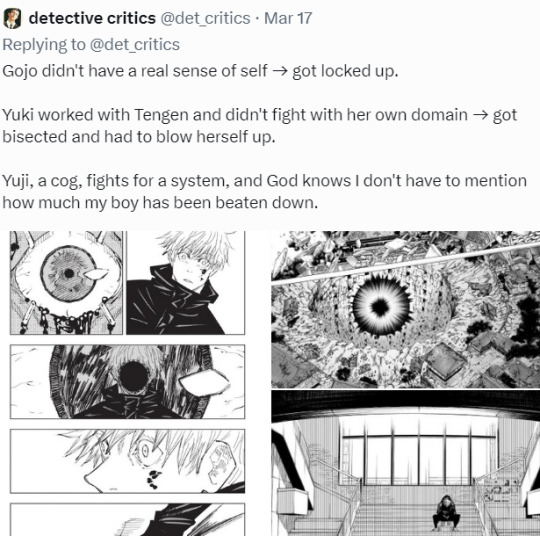
Gojo has an identity crisis as outlined by Geto, "are you Satoru Gojo because you're the strongest, or are you the strongest because you're Satoru Gojo?"
It's a challenge for him to find some reason to live outside of being the strongest, and in tragic fashion Gojo just doesn't find it in time. Gojo lived for fighting others, and proving to himself that he's the strongest, and that's how he dies.
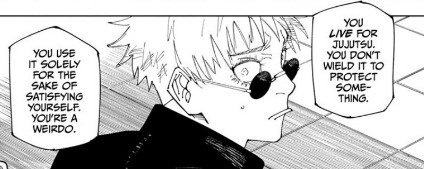
There's something I like to say about narrative punishment in stories. There are two ways to punish a character, you either don't give them what they want, or you give them exactly what they want. This is the latter, Gojo wanted to find someone stronger than him because deep down he believed that nobody could understand him unless they were on his level. He wanted to be surpassed, and that's why he focused on creating stronger young sorcerers, but he never shook himself of the belief that only someone as strong or even stronger than he was could ever be emotionally attached to him so he made a deliberate choice to draw a line between himself and others.
Gojo's essentially gotten what he wanted from that choice in the worst way possible. The student he picked to succeed him Megumi, has his body stolen and kills him. Gojo is surpassed, but it's not by one of his own students it's by an enemy that's not only trying to kill Gojo but is going to massacre his students afterwards.
Gojo's spent his entire life believing that because he's more powerful that makes him inherently different and above others, and being lonely because he himself believed he couldn't relate to ordinary people and he dies like an ordinary person, an unsatisfying death where he wasn't able to bring out Sukuna's best, where he gets unceremoniously cut in half offscreen but yay he's no longer the strongest. He's gotten exactly what he wanted. Megumi is still not saved, Sukuna's probably going to kill more people because Gojo failed to stop him here, but hey at least he stopped to compliment Gojo.
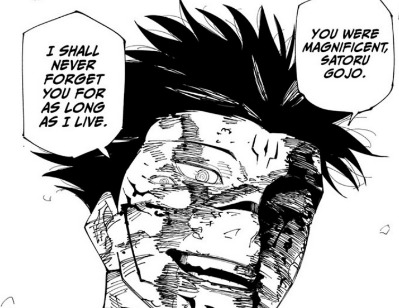
It's empty, but it's empty because of the choices Gojo made in life to just not bother connecting to people or develop any kind of identity besides being a sorcerer. Gojo lives and dies as a sorcerer, and his dying dream is returning to a teenager being surrounded by everyone he was with during his school days, because that's the happiest time in his life. Ironically he was happier before he became the strongest, because that was the only time in his life that he allowed himself to connect to people.
However in the eyes of others, he is someone who has it all. That's why he is always alone. There was no one who could hold the same sentiments and mutually understand him. Geto was the only one who could understand what he was trying to say, and the only one who could communicate well with him.
It's no coincidence Gojo and Geto die exactly a year apart on the same day, if anything I'd say the reasons they die are similiar to at least thematically. They both die because they don't want to live in the world. Geto thinks the world is too corrupt and GOjo doesn't want to be anything other than a sorcerer, both of them fail to adapt.
「 'It's just. . .' It's just that it was what Geto had to do. [...] To someone like him, the reality that the world of sorcerers presented to him was just too cruel. '. . .that in a world like this, I couldn't truly be happy from the bottom of my heart.'」
They can't be happy in a world like this from the bottom of their hearts, so narratively they both die. The things they chose to live for at the end of their life they fail to accomplish, Gojo is no longer the stronget, Geto fails to wipe out mankind or make major changes to the world and they die as normal people unsatisfied because they weren't trying to live in the world and make connections to others. They die almost karmically a year apart because their main connection for both of them, the thing which made them feel connected to the world and other people was each other.
Which is why this panel breaks my heart and is so narratively satisfying because of how unsatisfying it is...
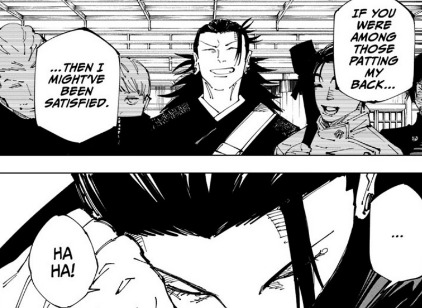
"If you were among those patting my back... then I might've been satisfied."
Gojo reflects that he's not satisfied dying against Sukuna, not because he failed to give him a good enough challenge but because Geto wasn't there to pat him on the back. The one thing that would have satisfied him he couldn't have, because he didn't live to connect to people he lived to be the strongest and he died alone as the strongest. There's just something deeply upsetting about Gojo's dying dream fantasy just him being there talking with all of his dead friends who he never appreciated or connected to properly when he was alive. Knowing that if something had just gone a little differently, that even if he had to die no matter what he could have died happier if Geto was among the people saying goodbye to him because that connection with Geto is what gave his life meaning.
Dazai Osamu: "A life with someone you can say good-bye to is a good life, especially when it hurts so much to say it to them. Am I wrong?" -Bungou Stray Dogs Beast
2K notes
·
View notes
Text
big fan of how a couple of hints were dropped that iruka is actually way stronger than he lets on and then nothing came of that


#iruka...king of my heart#iruka umino#here’s the thing#iruka deserved way way way more screen time#iruka is hotter than kakashi#i said what i said
4K notes
·
View notes
Text
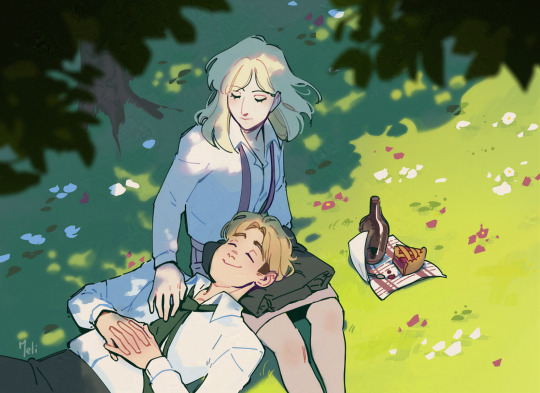
I've been longing for a nice break in a park or something, so i drew just that :)
445 notes
·
View notes

